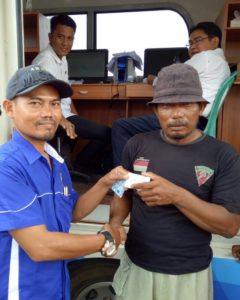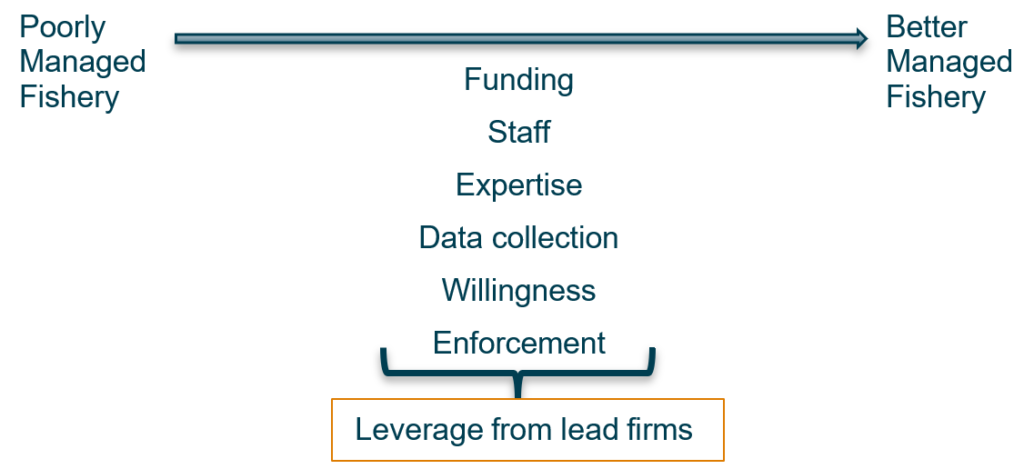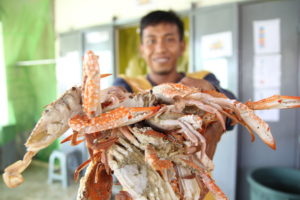LEVERAGE LEAD FIRMS: ENDURANCE AND EFFICIENCY
Lead Firm Pilot Projects
When we evaluate value chains, we look for lead firms: small, medium, or large enterprises that are linked to many other players in the value chain and can influence the practices of these commercial partners. Ideally, these firms are thought leaders in their fields and open to innovation. Building on our value chain and market research, we work with these firms to lead by example. We collaboratively design and implement pilot projects that help overcome barriers to triple bottom line business growth.
Through these projects, we test our research findings, learn more about what will work on the ground, and iterate on real-world solutions. These pilot projects not only improve business practices within the lead firm, but throughout the fishery value chain. When successful, they generate financial returns that demonstrate the viability of new approaches in the industry and inspire other businesses to follow suit, thus improving industry competitiveness. They create new norms in the market that are sustained because of their business value rather than relying on ongoing philanthropic support or government subsidies to succeed.

Role of Lead Firms
Sustainable and profitable fisheries are built on secure tenure, sustainable harvests, and monitoring and enforcement, according to research behind the report, “Towards Investment in Sustainable Fisheries”. Rather than waiting indefinitely for these enabling environment conditions to transpire, using a lead firm approach allows project developers to leverage the assets and abilities of industry to progress towards better managed fisheries. In return for their contributions, lead firms in fisheries promote decreased supply volatility; increased long-term availability of the resource; improved supply chain efficiency, and more.

Lead Firm Project Goals and Benefits
Wilderness Markets’ goal with lead firm projects is to attract private, return-seeking impact investment and complement ongoing work by fishery managers and NGOs to improve fisheries. This approach enables local fishermen to adopt sustainable practices faster than waiting for the government to independently create and enforce management changes, and without the economic hardship for fishermen that often accompanies changes in fishery regulations. It will also bolsters business advocacy for more effective fisheries management policies and enforcement through a local cooperative structure.
Lead Firm Experience
From 2016 to 2017 we engaged with a lead firm, Blue Star Foods, in the blue swimming crab fishery in Indonesia. Our primary goals were to engage a lead firm to secure change on the water and development an investment model. We gained some valuable learnings, including the importance of fisher organizations; the need for ongoing, structured and unstructured facilitation between stakeholders; and the importance of pre-agreements for data collection analysis, and management.

By working with a lead firm, the financial viability of data collection and management was validated, and many of the improvements in the value chain have continued to date, despite the project ending in 2017. [
For the fishermen, participation in the project included signing up for the Indonesian fisher ID card – Kartu Nelayan – which conferred immediate benefits to the fishers, such as life insurance. The government also benefitted from getting better counts of fishermen in the area. Through their participation, harvesters were provided clear and reliable financial benefits for small-scale fishermen to make gear changes; follow harvest control measures; and take on other sustainable fishing practices.
Successful Lead Firm Characteristics
- Industry leaders: innovation, technology, experience
- Highly connected in the value chain: linked to large numbers of producers
- High capacity: can provide technical assistance, credit and inputs
- Financially stable: can make long-term investments towards sustainability
- Excellent market access and understanding: connected with multiple markets (to decrease risk) and routinely attend industry events and conduct analysis to stay attuned to market dynamics
- Respected influencer: others in the industry look to them for thought leadership and hold them high esteem
- Willingness: firm indicates a willingness to work with project developers, including signed agreements
Adapted from: “Integrating Very Poor Producers into Value Chains: Field Guide” by USAID, fhi360 and World Vision, October 2012.


